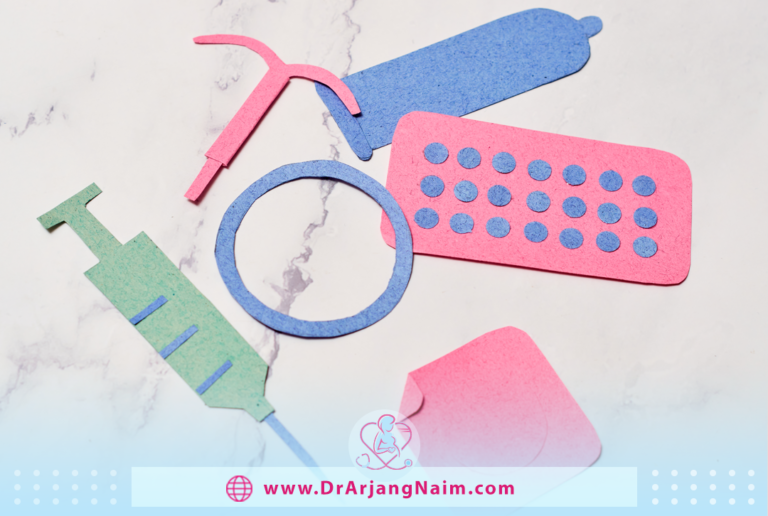Contraceptive implants are a long-term method of preventing pregnancy. They are also called long-acting reversible contraception, or LARC.
A contraceptive implant is a flexible plastic rod about the size of a matchstick that is placed under the skin of the arm. The implant releases a small and constant amount of progesterone.
Progestin prevents pregnancy by stopping ovulation and thickening the cervical mucus. This makes it difficult for the sperm to reach the egg. Progestin also thins the lining of the uterus. If the sperm reaches the egg, it becomes harder for the fertilized egg to attach to the uterus.

Birth control methods
Methods of preventing pregnancy, including Hormonal methods and Barrier methods.
Hormonal methods include
- Oral contraceptives (birth control pills)
- Patches
- Rings
- Injections
- Implants
- Intrauterine devices (IUDs)
Barrier methods
- Barrier methods include:
- Condoms
- Diaphragms
- Cervical caps
- Spermicides
Other methods
- Withdrawal (pulling out
- Rhythm method (fertility awareness method)
How does the birth control implant work?
The birth control implant is a small, flexible rod that is inserted under the skin of your upper arm. It releases a steady dose of the hormone progestin, which prevents pregnancy in several ways:
- Thickens cervical mucus: This creates a physical barrier that prevents sperm from reaching the egg.
- Thins the uterine lining: This makes it less likely for a fertilized egg to implant in the uterus.
- Suppresses ovulation: This prevents the release of an egg from the ovary.
- Effectiveness: The birth control implant is one of the most effective forms of birth control available, with a failure rate of less than 1% when used correctly.
How effective is the contraceptive implant?
Hormonal implants work more than 99% of the time. How are they compatible with other birth control methods?
- Intrauterine devices (IUDs) are also 99% effective.
- The contraceptive injection is 94% effective.
- This pill is 91% effective.
But none of these methods will protect you from sexually transmitted diseases (STDs). Only condoms prevent sexually transmitted diseases.
Birth control implant: pros and cons
The birth control implant is an effective and convenient method of preventing pregnancy. It’s one of the most reliable options available, lasting up to three years without requiring daily reminders or pre-sex preparations. Additionally, it’s cost-effective in the long run and can alleviate menstrual symptoms like cramps and heavy bleeding. For those who can’t use estrogen-based birth control, the implant is a safe alternative.
However, it’s important to note that the implant doesn’t offer protection against sexually transmitted infections. Insertion requires a healthcare professional’s visit, and the device must be replaced every three years. While rare, the implant can occasionally migrate from the insertion site, making removal more challenging.
Who should not use contraceptive implants?
You should not use a contraceptive implant if:
- You are pregnant or may be pregnant
- You have a history of severe blood clots, such as blood clots in the legs or lungs
- Have you had a heart attack or stroke
- Have a history of breast cancer or any other progesterone-sensitive cancer
- Unexplained vaginal bleeding
- They are allergic to any of the ingredients or materials in the implant
Before having an implant, you should also tell your healthcare professional if you have:
- Diabetes
- High blood pressure
- Gallbladder or kidney conditions
- Liver disease
- History of depression
- High cholesterol
- Migraine
- Allergy to anesthetics or antiseptics

Risks
The contraceptive implant does not protect against sexually transmitted infections.
Less than 1 in 100 women who use the contraceptive implant for a year will become pregnant. But if you get pregnant while using the implant, it is more likely to be an ectopic pregnancy. This means the fertilized egg is implanted outside the uterus, often in the fallopian tube. However, the risk of ectopic pregnancy is still lower than those who have sex without birth control. Because the pregnancy rate is very low when using the implant.
Side effects associated with contraceptive implants include:
- Pain in the back or stomach
- Changes in periods that may stop completely (amenorrhea)
- High risk of non-cancerous or benign ovarian cysts
- Decreased libido
- Dizziness
- Headache
- Mild insulin resistance
- Mood swings and depression
- Nausea or stomach upset
- Painful breasts
- Vaginal pain or dryness
- Weight gain
How effective are contraceptive implants compared to other long-term options?
With over 99% effectiveness, the contraceptive implant is one of the most effective methods of birth control available. However, the implant is not the only type of reversible birth control that works for the long term.
The following long-term birth control options are also available:
- Copper intrauterine device (IUD)
- Hormonal IUDs
- Depo-Provera shot
All these methods are very effective. With either of these options, you don’t have to think about birth control on a daily or even monthly basis. However, these methods do not protect against sexually transmitted diseases. The biggest difference between these methods is how long they are effective:
- The Depo-Provera vaccine should be administered every three months.
- The contraceptive implant works for three years.
- Hormonal IUDs are effective for 3 to 5 years, depending on the brand.
- Copper IUDs can be effective for up to 12 years.
Side effects are similar for all these methods. Irregular bleeding and changes in menstruation are the most common. The copper IUD may have fewer side effects than other options because it does not contain hormones. All four methods require a visit to a healthcare professional for injections or infusions.

Preparing for a contraceptive implant
Here’s a breakdown of what you can expect when preparing for your contraceptive implant appointment.
Before your appointment
- Consult with a Healthcare Provider: Discuss your options, benefits, and potential side effects with a doctor or nurse.
- Confirm Pregnancy Status: Ensure you’re not pregnant before the implant is inserted.
- Prepare for the Procedure: Wear clothing that allows easy access to your upper arm.
- Gather Information: Bring any relevant medical history, including allergies and current medications.
During your appointment
- Consultation: You’ll likely discuss your medical history and concerns with your healthcare provider.
- Numbing: A local anesthetic will numb the area where the implant will be inserted.
- Insertion: The implant, a thin rod about the size of a matchstick, will be inserted under the skin on the inside of your upper arm.
- Aftercare Instructions: Your provider will give specific instructions for caring for the insertion site and managing potential side effects.
Additional tips
- Plan: Schedule your appointment at a time that works best for you and allows for sufficient recovery time.
- Ask Questions: Don’t hesitate to ask your healthcare provider about the implant, the procedure, or potential side effects.
- Consider Pain Management: If you’re concerned about pain, discuss options with your provider, such as over-the-counter pain relievers or applying ice to the area.
- Remember: The insertion process is generally quick and minimally invasive.
Most people experience mild discomfort or soreness afterward, which typically resolves within a few days.
How quickly do contraceptive implants start working?
Contraceptive implants usually start working within 24 hours of being implanted. However, it is recommended to use additional forms of contraception, such as condoms, for the first week after insertion to ensure full effectiveness. This is because it takes a few days for the implant to release the hormone into your bloodstream and prevent pregnancy fully.
The bottom line
The implantable capsule of birth control is an effective method to prevent pregnancy that is placed under the skin of women’s arms. In this situation, progesterone prevents pregnancy by being released into the bloodstream for three years. However, the contraceptive implant is not suitable for everyone. In this situation, you can consult a gynecologist. Dr. Arjang Naim can help you choose the proper contraceptive method.
Additional questions
- Do we get periods with implants?
Yes, you may still experience periods while using a contraceptive implant. However, the nature of your periods may change. Some women may experience lighter bleeding, irregular periods, or no bleeding. It’s important to note that changes in menstrual bleeding patterns are common with hormonal birth control methods, including implants.
- How is the contraceptive implant removed?
To remove the implant, a healthcare professional will first numb your arm. Then, they usually make a small incision where the implant is and remove it.
- What is the safest contraceptive method?
The “safest” contraceptive method can vary depending on individual factors, such as your health history, lifestyle, and preferences. There’s no single “one-size-fits-all” answer.
- How effective is pulling out?
With typical use, withdrawal is 78% effective. With perfect use, withdrawal is 96% effective.
- Which contraceptive method has no side effects?
No form of birth control is without side effects, but the IUD seems to have few side effects. That is why it has become popular among women of all ages.
References
https://www.mayoclinic.org/tests-procedures/contraceptive-implant/about/pac-20393619
https://my.clevelandclinic.org/health/articles/24564-contraceptive-implant
https://www.plannedparenthood.org/learn/birth-control/birth-control-implant-nexplanon
https://www.webmd.com/sex/birth-control/birth-control-implants-types-safety-side-effects
https://kidshealth.org/en/teens/contraception-implantable.html
https://www.healthline.com/health/birth-control-implant#medical-attention




